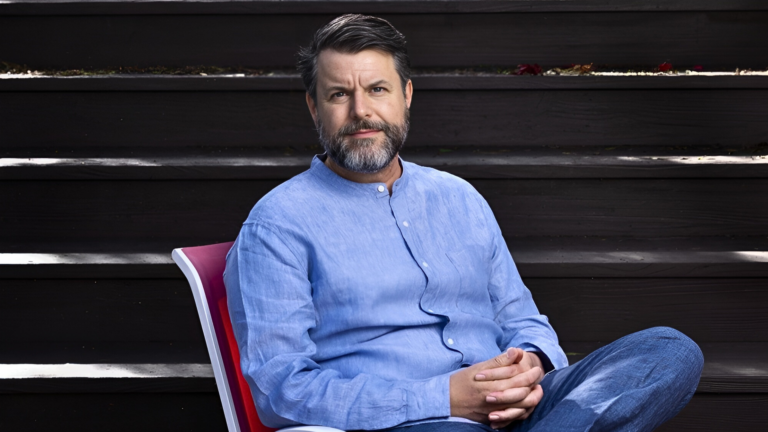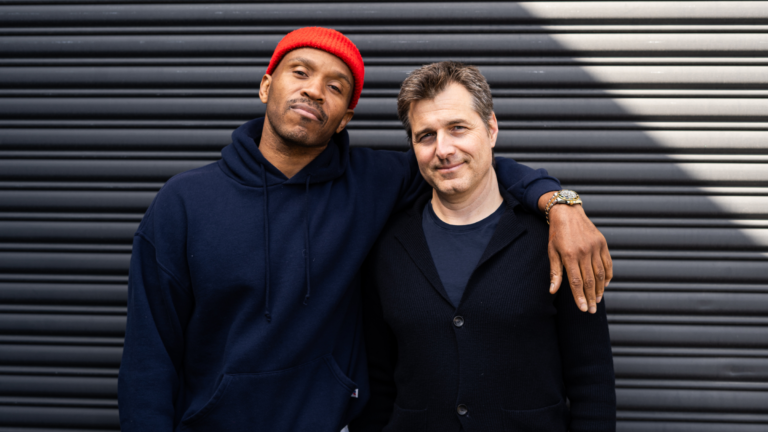This week’s conversation is with Dr. Chris Mattmann, the Chief Technology and Innovation Officer at the NASA Jet Propulsion Laboratory, also known as JPL.
His work has helped NASA explore space, and helped journalists and governments track international financial crime amongst the world’s elite across the globe.
Chris is best known for a 20 year career inventing the most downloaded software on the planet culminating from his membership on the Apache Software Foundation Board of Directors (2013-18), creating technology that powers all the data systems in industry including his pioneering work building the Tika library.
Tika, the “digital babel fish” is the key technology that solved the Panama Papers and won the Pulitzer Prize in journalism in 2017.
Chris is a frequent keynote speaker in government, academia and industry and his work helped to define the field of data science.
At its core, this conversation is an exploration of what it means to innovate – it’s about deep learning (one of the core tenets of growth) and the duality of technological progression in the modern world.
“We need to assess things, look at the data, and make decisions. And that’s not specific to data science or technology. That’s life, baby.”
In This Episode:
What is the Dark Web?
What’s really interesting is that there’s a public internet. That’s the internet that we all transact on. We put our content out on – where you’re going to publish the podcast. There’s also what’s called the deep web on the public internet. That’s the web behind logging in and forms. So if you’re going to log into your bank, you can’t see it without transacting within things like that. That’s the deep web. So 3% of the actual public internet is the internet you can see. 90 plus percent of that, maybe 97% of the remainder is what we call the deep web, the web behind forms and JavaScript and all that. And then the dark web isn’t even that. The dark web was invented in the early 2010 timeframe and basically what it was invented at was an anonymized communication protocol. It came from the Department of Defense in the US. They wanted basically a way to anonymously and securely communicate between different folks in the battlefield. That protocol it’s called the Onion Protocol. There’s a technology around it called Tor, which allows you to operate on that protocol. Is an entirely different internet, not subject to basically Googles and all of that of the world.
The dark uses of the Dark Web
The “bad guys,” what they found is that this is a pretty good protocol. In fact, in the Snowden papers, what they found and some of that information that he leaked out was that even the government CIRCA 2012, the NSA, the National Security Agency in the US, didn’t have the capability to crack in or spy on or read or know what’s going on, on that dark web. That anonymized internet, based on that protocol and Tor and the onion protocol. So basically what they were finding is that, people who were doing human trafficking, people that would sell weapons and arms, people that would put out electronics. They were going on that protocol, they were getting the Tor Browser, which allow allowed you to… It’s like your Chrome or your Mozilla, the way you browse the internet, except that’s the way you browse the dark web and they were standing up marketplaces there. One of the most famous ones was the one you might have heard from Ross Ulbricht. If you’re a Netflix fan and you heard about the Silk Road, that was one to basically buy illegal pharmaceuticals and drugs and things like that.
Should fear hinder innovation?
People say, “Well, how do you grapple with that?” Like you just said, and I say, “Well, but look at all the good it did.” I’ll explain it like I would to my 12 and a half year old. You could take a spoon and kill somebody. Does that mean we shouldn’t have spoons? I mean, that’s obviously an extreme analogy, but it’s the truth, in my mind… It’s like looking at Dr. Ian Malcolm in Jurassic Park, who sits there and he is talking to Sam Neill and he said, “You stood on the shoulders of giants. You took all that DNA research to the next level, but you didn’t ask yourself, should you?” Well, I’m of the mindset, they should have.
His personal process for clarity
I want to take in information. I want to revise my hypotheses. I want to take in more information. And I’ve adapted my positions on things over time, as science allows us to do.The thing I hate sometimes Mike, I’ll just share that with you real quick, is that doesn’t mean we should be paralyzed by analysis. Just like everything in life, in moderation. A little bit of analysis, a little bit of decision making, but don’t only have one of the extreme.
Chris’ humble beginnings
I grew up in a trailer in Santa Clarita, California. It’s about an hour north of Los Angeles… From trailer to USC. I looked around and I saw the people with their fancy cars and stuff like that, and dreamt about what could be. Again, I’m not making any judgment calls. Many of them are dear friends of mine, that I knew and I don’t care what background you came from. There’s good everywhere. But I’m just saying, at least for me, I came through a thin funnel. It’s not like everybody comes out of the funnel that I come in or I came from and had the opportunity. I won’t even say it was all driven by me, but the opportunity to do this. So yeah, I grew up in a trailer. I had a beautiful family that loved me dearly. We just didn’t have a lot of money. We didn’t have very much money at all. We didn’t have very much of anything. I love sports. When I realized I couldn’t be an athlete, because I’m 5’9″ and everyone around me was growing when I was playing high school football, but I wasn’t. So I invested in my mind. I said, “Well, how am I going to make it? How am I going to get the hell out of Santa Clarita and do something?”
He had something to prove… to himself
I had a bunch of imposter syndrome. Again, also not just from looking at everyone around. It’s not only like this. I’m being facetious, but driving nice cars, coming from families that actually know what’s going on with their children and have the means to support. I had imposter syndrome, when I got there and I was like, “Do I belong here? Am I good at this? I don’t know.” But I dedicated myself and I went through this transition of proving to myself in a couple years that I was the first one in my class at SC undergrad, from ’98 to 2000 in engineering that had a job. I had a job when I was a sophomore. I got a job at JPL. I stayed up in the computer lab at night. I didn’t know what JPL was at the time, but I knew it was money. Some people said it was good.
A constant desire for growth
I mean, there are some people who could make the same painting over and over again because it gives them something. It doesn’t matter that it’s repetitive or whatever, but for me, it does. Once I’ve done something once, I just want to move on to the next thing, or if I’m going to do that again, I just want to copy and paste it because that’s how, in some ways, like I said, you grow. For me, when I was trying to challenge myself to do these things or to prove to myself that I was doing, it’s me constantly fighting the internal, “Chris you’re bored. You don’t want to do this.” Or maybe I have ADHD. I don’t know. I’ve never been diagnosed, but it’s not the constant desire to chase the next thing, but to interest myself with it or keep the interest up.
Progress over perfection
There are people that can immediately look at a situation and generalize and develop what they call a product line or more of a reference architecture for doing things. They can look at a situation, even the first one they’ve seen and be here are the general parts and components of it and here’s how I would repeat those or scale them or do of them or whatever. I am not one of those people. I can do that, but I don’t favor that. I favor building something. The other side of that, and it’s not exclusive, but it usually falls into these two camps. The other side is you build something it’s not efficient. It’s not the right way. You build a house and you learn a lot about doing it. Maybe the next one you build is more efficient. You don’t make the same mistakes. You make a little less of them. You build another one and then all that. For me, most of my process where I’m successful is I look at something or something that I want to disrupt in a domain or a technology or just something I want to do and I create. I build the first version of whatever. And again, it goes to my style. I want to work on that new thing or whatever, but once I’ve done it, the next time I want to spend less time doing it.
Data is the new oil
Andrew Yang nailed this in his campaign, during the last political campaign, not the one for mayor, but the one when he ran for president. He said, “Data is the new oil.” There’s a lot in that. What is he saying? Well, to get to oil, we got to have crude and we got to take the crude and we got to refine it and lead it, unlead then high octane. We got to go through this whole process to do that. So we take unstructured crude, and we turn into a structured oil that we can then power or create energy with. Same thing with data and the same thing with AI. Imagine AI is the car. AI runs on gas, that’s data and there’s an infinite supply on that. We spent the first part of the episode, talking about the dark web, the deep web, all that. The web itself is an infinite supply, near infinite. TikTok, this, that all the social media, but everything else, science of data, but it’s unstructured and we need to refine it. We need to take the crude and turn it into structure because the thing about the AI car that it wants is it wants very structured, labeled training data. Because it needs to learn patterns, how to repeat, how to gamify that against each other, and have just the same battles we have in our mind. Should I do this? What would happen if I do this? And then game planning and scenarios. That’s what AI does.
His view on blockchain capabilities
Today we’ve heard about these things in the context of purchasing and buying power because people see it as a get-rich-quick scheme. In some cases, if you’re willing to roll the dice it is, but over the long-term, I’m less bullish on the fact that I’m going to take a bunch of money out of my bank account in US dollars and put it all into Bitcoin and Ethereum, and suddenly I’m going to become a millionaire. I’m less bullish on that. I’m more bullish on the technology capabilities and what the blockchain itself provides, because it really is a representation of, like I cited Yang before, refinement of crude into data that we actually need and what you could do with that. All sorts of AI, all sorts of automation, all sorts of foundational things that we can do once we have that capability. And the blockchain is so much further along today than it was five years ago.
Virtual reality in the workforce
The biggest thing I’m bullish on is the relationship between virtual reality and where we are going with the future of work. JPL is stricken by this just like many tech big companies and everything. Our population distributed in the pandemic. Everyone used to live here. You had to be close to the lab are somewhat close. I mean, the furthest people away might have lived in the mountains a couple hours away in Wrightwood or on the way to Vegas or in the South Bay, but you still live within a couple hours. You lived in the five county L.A. area. You don’t anymore. I’d say, maybe 50% of our population doesn’t. We have a hybrid workforce. That’s not going to change. That’s how people advance got a house, moved on in their lives so that they’re not going to give that up. We need VR, we need more immersive experiences, we need more connections. I’ve been heavily of researching that in the context of my job at JPL and my teams to basically figure out how we put on these headsets, get in, feel, touch, see realistic representations of each other and connect.
Metaverse
I’m totally on the metaverse. The other thing is these devices like Facebook, Meta makes a device for VR, that’s called the Quest 2. In my mind, it’s changed the game. It is cheaper than a cell phone. So now you go back to people with my history that grew up… It’s a birthday present. It’s 300 bucks. I mean, even I could have in the trailer got one of these. It’s a lot of money, but I could get it for my birthday or whatever. So now it’s not just high tech, rich, affluent people that get it. We’re seeing these in classrooms. Classrooms could buy 20 of them now, whatever. It’s not the most comfortable thing to wear all the time and being in there for many hours, we still need to figure all that out and we don’t know all that yet. But what I can tell you is this type of experience in a Zoom or two dimensional is just flat out, thrown out the way. If you use it for nothing else than just to meet people, there are free, easy to use capable technologies in there in which you and I could shake hands, high five, and dance. We could go to a forest and a campfire. I could show you JPL and walk you around. Just blown away by that experience. So, yeah, I am totally in the metaverse.
Chris’ best practices for personal growth
Don’t jump to the next level without succeeding at every level. Lots of people need to understand that, because when it’s time to go to the next level, if you succeed at every level, it’ll naturally happen and you won’t be pushing. Succeed at every level. The other is and I see a lot of this today that I think people could benefit from. Those who do decide. By the way, the first one was a manager, one of my dear friends at JPL told me that one and it’s born true in my career. The second one is from the open source world. Those who do decide. I see too many people today who Mike, you and I are digging a hole and they’re standing around the hole telling us how we could dig the hole better. Those who do decide, baby, no, you want to do it better? Get down here and dig the hole.


